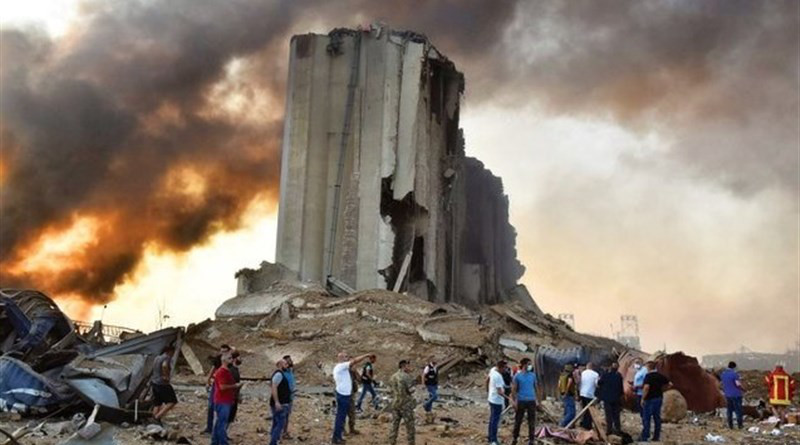Why Macron’s ‘Unity Government’ Would Fail Lebanese People – OpEd
By Arab News
By Dr. Dania Koleitat Khatib
French President Emmanuel Macron last week launched a charm offensive in Lebanon. In the aftermath of the devastating explosion, he headed to Beirut to address the Lebanese people, showing support while scolding the political elite like little schoolchildren who had failed to do their homework.
Tens of thousands of desperate Lebanese went on to sign a petition asking for the return of the French mandate. Macron went to the Gemmayze neighborhood and met with people, while the Lebanese president and prime minister did not dare to face the popular wrath. Instead, they only addressed their people through pre-recorded, scripted speeches.
Macron promised the Lebanese people change and said he would come back at the beginning of September, when, if they hadn’t conducted reforms, he would deal with them. He splashed the Lebanese with attractive buzzwords like a new “political contract,” “political change,” and a “unity government.” As he was leaving, he tweeted “I love you Lebanon” in Arabic. However, what real change can he bring? How is he planning to instigate political change?
Macron’s declaration of love left many disappointed, as he was viewed as giving Hezbollah legitimacy. Macron contacted US President Donald Trump and urged him to ease sanctions on Hezbollah because they are counterproductive. The general discourse in Lebanon is that Macron’s plan is to reinstate Saad Hariri in a unity government in return for concessions from Hezbollah. Macron is talking about leaders who don’t represent the Lebanese anymore. In fact, the Lebanese were gathering in downtown Beirut and hanging effigies of these leaders from symbolic gallows to express their total refusal of the current political elite.
US Under Secretary for Political Affairs David Hale will be in Lebanon on Wednesday to discuss the situation. Hale, who has previously been known to be soft on Lebanon, is this time likely to be delivering a tough message to the Lebanese leadership. Macron’s efforts are unlikely to affect the American policy. People in Congress are angry at what has happened. Democratic Sens. Jeanne Shaheen and Chris Murphy, who are both members of the Senate Foreign Relations Committee, issued a statement pushing for further American engagement in Lebanon in an effort to bring much-needed change to the country.
While meeting people in Gemmayze, Macron reminded them that the French previously created their own revolution. However, Lebanon today is very different from France in 1789. While in France it was the bourgeoisie and the people facing the king and a sagging aristocracy, volatile Lebanon has foreign-backed militias operating internally.
As for the ballot that Macron also mentioned as a means to instigate change, Lebanese elections are currently designed and tailored to always reproduce the existing political elite. Echoing Macron’s proposal, Samir Geagea, the head of the Lebanese Forces party, is suggesting early elections using the current law. If Lebanon takes this path, we will have a similar situation to 2005. Then, following the death of Rafik Hariri, protesters took to the streets. Disgusted by the assassination, the majority of people voted for the Hariri camp, but little changed: The corrupt people were still in control and, on May 7, 2008, Hezbollah used its weapons to intimidate opponents. It was also later able to gain the majority of the government and be in control of the country.
Following his visit to Beirut, Macron gathered 15 world leaders, including Trump, to pledge immediate relief to Lebanon. However, the $297 million of pledges are unlikely to lift the country out of its financial and economic troubles. Macron also demanded an independent international investigation into the explosion — a call echoed by UN chief Antonio Guterres. But Lebanese President Michel Aoun rejected the idea of an international probe, claiming it would constitute a breach of the country’s “sovereignty.”
In an attempt to diffuse popular anger, the puppet government resigned. However, nothing has changed and nothing will change, even with a newly elected government, because the system was created to suit the political elite and not express the true will of the people. Unlike in 2005, the Lebanese people should not be duped by any political maneuvers. They should not accept mediocrity in return for some momentary and fake stability, as alluded to by Macron’s call for a “unity government.”
The international community, especially the US, can help Lebanon by insisting on an international investigation. They have the right to do so, as French, American and Dutch citizens were injured or lost their lives because of the explosion. Such an investigation would incriminate the entire political elite. It would also incriminate Hezbollah, as the general discourse increasingly carries accusations of the group illegally storing ammunition in the port, which is a civilian facility in close proximity to schools, hospitals, churches and mosques.
The main issue for the US might be Hezbollah, and the main opportunity might be the anti-Hezbollah mood it can capitalize on, but for the Lebanese it is way beyond that — it is about institutional corruption. The corruption is so rife that people are already talking about the embezzlement and sale of the aid that was offered to Lebanon by Kuwait.
Therefore, the main driver behind change should be the Lebanese themselves. This might be their only chance to instigate structural reform. They should not wait or rely on external help to change their reality. They have to take their fate into their own hands: It is a do or die situation. They should hold their ground and continue in the streets until the entire corrupt regime is gone: “Killun yaani killun” (all means all).
- Dr. Dania Koleilat Khatib is a specialist in US-Arab relations with a focus on lobbying. She holds a PhD in politics from the University of Exeter and is an affiliated scholar with the Issam Fares Institute for Public Policy and International Affairs at the American University of Beirut.

